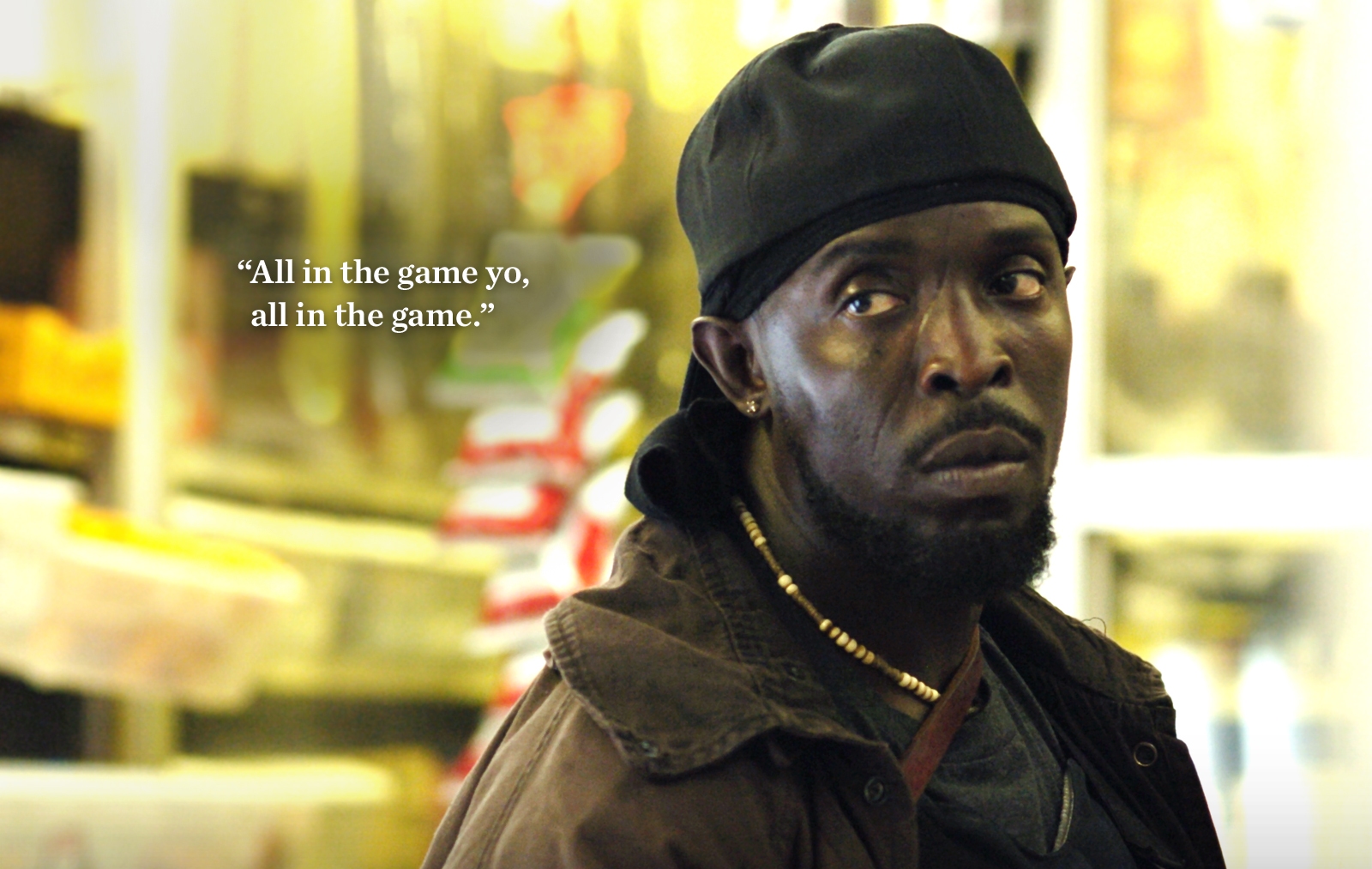Entries in Counterfeiting (73)
With The Wire Gone, It's all about Counterfeit Purses
 The Wire’s Omar: “All in the game yo, all in the game.”
The Wire’s Omar: “All in the game yo, all in the game.”
Maybe it’s because The Wire’s off the air.
And would it kill Richard Price to come out with a new novel?
What’s a trademark attorney to do these days but to live through gritty stories of hand-to-hand, buy-bust operations about … counterfeit purses!
I guess that’s why I found this NYT story interesting.
Complaint Alleges Use of Copied Karaoke Songs Constitutes Counterfeiting
Here’s a case complaining about illegally-copied music, but there’s nary a copyright claim in sight.
It’s all based on trademark and unfair competition law.
In Slep-Tone Entertainment Corp. v. Lady Luck Steakhouse & Saloon Inc., plaintiff manufactures and sells karaoke tracks. It claims the defendant venues and karaoke jockeys (KJs) “illegitimately obtain, copy, share, distribute, and/or sell media-shifted copies of the Plaintiff’s accompaniment tracks” without paying royalties to the copyright owners of the underlying musical works.
The lawsuit, filed in the Western District on July 1, claims this amounts to counterfeiting, since the copies include plaintiff’s SOUND CHOICE registered trademark and the subject discs are “virtually indistinguishable from genuine Sound Choice materials.”
The complaint also asserts defendants’ use of counterfeit karaoke tracks constitutes unfair competition. “Illegitimate competitors offer libraries of tens of thousands of songs, which would have cost $50,000 to $100,000 or more to acquire legitimately, but produce shows for one-third the rates a legitimate KJ can offer. The result is significant financial pressure on once-legitimate KJs to skirt or ignore the law and become pirates, simply to stay in business. Slep-Tone has been forced to undertake this litigation in order to ensure that it survives and continues to produce high-quality karaoke music its fans demand and to level the playing field for the legitimate KJs.”
Defendants have not yet answered plaintiff’s complaint.
Plaintiff recently filed similar lawsuits in the Northern District of Ohio, the Southern District of Ohio, and the Eastern District of Virginia.
The case cite is Slep-Tone Entertainment Corp. v. Lady Luck Steakhouse & Saloon Inc., No. 11-1098 (W.D. Wash.).
Panel on Multidistrict Litigation Denies Motion to Centralize Counterfeiting Cases
I can’t remember seeing this before.
A motion to the Panel on Multidistrict Litigation to centralize a trademark dispute that’s spread over a number of districts.
That’s what plaintiffs Moroccanoil, Inc., and Moroccanoil Israel, Ltd., requested of their six cases — with five situated in the Central District of California and one in the District of New Jersey.
The Panel suggested that the parties cooperate, but declined plaintiffs’ motion to centralize the cases. There just wasn’t enough in common between the cases to justify plaintiffs’ request.
“On the basis of the papers filed and hearing session held, we are not persuaded that centralization would serve the convenience of the parties and witnesses or further the just and efficient conduct of this litigation. These actions do involve similar allegations of infringement of one or more of Moroccanoil’s trademarks, resulting from the sale or supply of purportedly counterfeit Moroccanoil Oil Treatment in 3.4 ounce bottles, which were sold at various retail outlets across the country. Despite the existence of some factual overlap among the present actions, highlighted by the alleged similarity of the counterfeit products and plaintiffs’ theory of a common source of counterfeit products, the proponents of centralization have failed to convince us that any shared factual questions in these actions are sufficiently complex or numerous to justify Section 1407 transfer.”
The case cite is In re Moroccanoil Trademark Litig., __ F.Supp.2d __, 2011 WL 1399464, No. MDL 2224 (U.S. Jud. Pa. Mult. Lit) (April 8, 2011).
Seattle Seller Caught with 33,700 Fake Handbags
King County prosecutors filed charges against a Seattle man accused of selling fake handbags.
The Seattle police collected 33,700 items from proprietor Touray Burama’s home. He allegedly ran EB’s Fine Handbags in south Seattle.
According to the Seattle-PI: “(An undercover officer) asked the worker [at EB’s] if the handbag on the wall was a ‘Kate Spade,’ investigators said in search warrants filed in U.S. District Court. The worker stated that the handbag was in fact a ‘Kate Spade’ and that he could sell it to her. However, he needed to sew on a ‘Kate Spade’ logo for her.”
Seems like that might be a tip-off the bags weren’t real. You mean you don’t put the Rolls Royce hood ornament on until after I buy the car?
Apparently Mr. Burama sold a few bags in his time. The P-I says the cops picked up $180,000 in its sweep, which Mr. Burama forfeited to the federal government. He’s now facing charges for counterfeiting.
Seattle eBay Seller's Lawsuit Against Coach Gets National Attention
Lots of media attention for Gina Kim’s class action lawsuit against Coach, Inc.
She says she used to work for Coach, had accumulated a few Coach handbags, and tried to sell them on eBay.
Ms. Kim says Coach accused her of selling counterfeit product and convinced eBay to pull her account. All without investigating whether her handbags were real or fake. So she sued for a declaratory judgment of noninfringement and for tortious interference with her relationship with eBay.
She now represents a class of persons she says have likewise been strong-armed by Coach.
AP story here; WSJ Law Blog post here.
It’s shameful if what Ms. Kim says is true. No matter how prevalent counterfeiting has gotten online, brand owners simply can’t assume all online sales of their goods are counterfeit. Accusing first and asking questions later just isn’t good policy. It’s against the law and suing innocent owners of the brand-owner’s product can’t be good for business.
Of course, Coach probably has a very different view of what allegedly happened.
We’ll see as the lawsuit unfolds — assuming it isn’t quickly settled.
